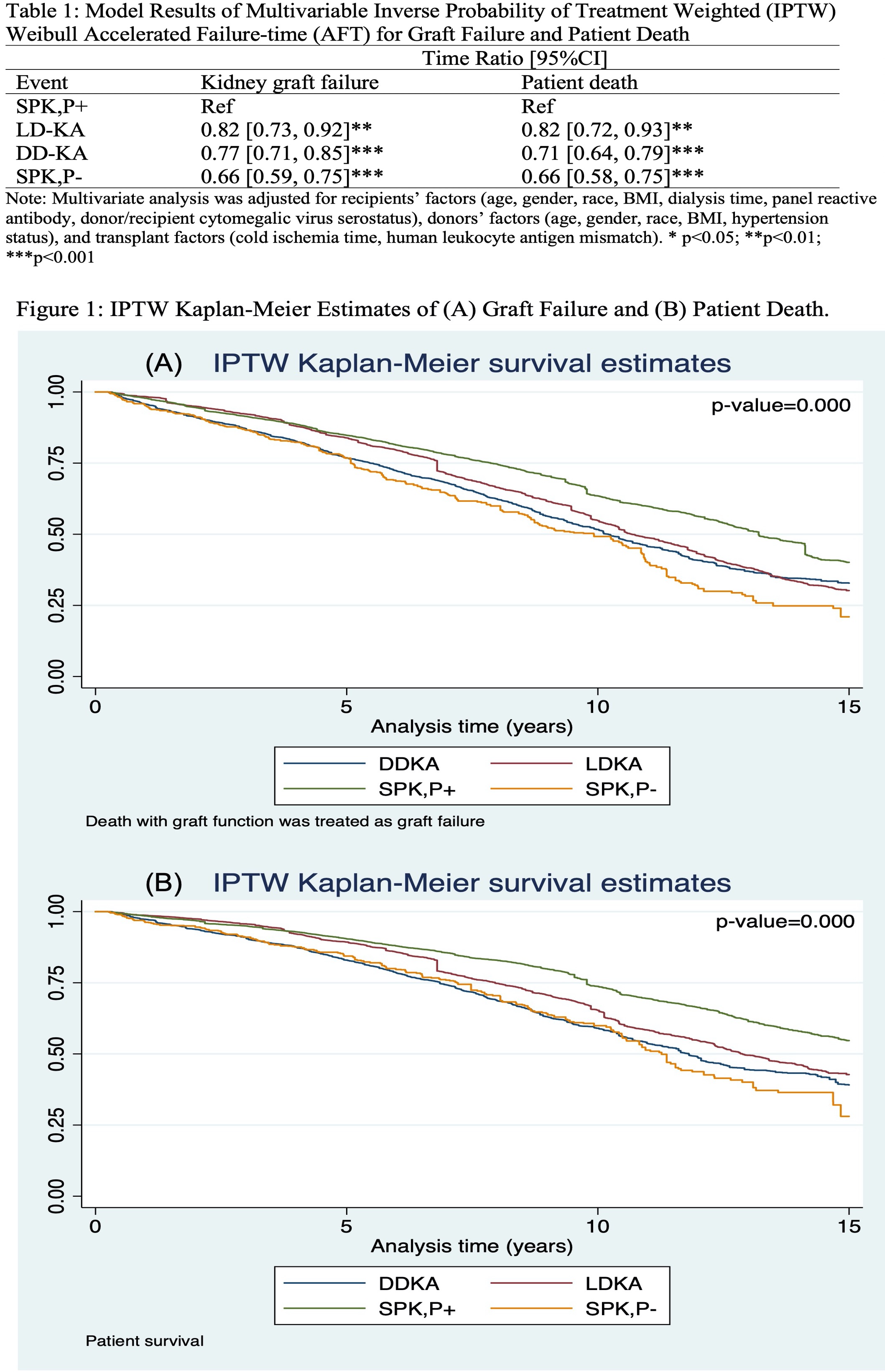Three‐Month Pancreas Graft Function Significantly Influences Survival Following Simultaneous Pancreas‐Kidney Transplantation in Type 1 Diabetes Patients
1Washington University in St. Louis, Saint Louis, MO, 2Saint Louis University, Saint Louis, MO
Meeting: 2022 American Transplant Congress
Abstract number: 1150
Keywords: Kidney/pancreas transplantation, Surgery, Survival
Topic: Clinical Science » Pancreas » 65 - Pancreas and Islet: All Topics
Session Information
Session Name: Pancreas and Islet: All Topics
Session Type: Poster Abstract
Date: Sunday, June 5, 2022
Session Time: 7:00pm-8:00pm
 Presentation Time: 7:00pm-8:00pm
Presentation Time: 7:00pm-8:00pm
Location: Hynes Halls C & D
*Purpose: Simultaneous pancreas-kidney transplantation (SPK) is the only persistently successful treatment option for patients with diabetes mellitus and end-stage renal disease. However, SPK carries a 7-22% rate of technical failure, defined as graft loss within 3 months of transplantation. In this study, we quantified the impact of three-month pancreas graft function on kidney graft failure and patient survival following SPK in type 1 diabetic (T1DM) patients.
*Methods: We examined a national transplant registry for 22,258 T1DM patients who received transplant between 2000 and 2021 and survived the first 3 months with a functioning kidney. Transplant patients were categorized as: deceased‐donor kidney transplant alone (DDKA), living‐donor kidney transplant alone (LDKA), SPK recipients with a functioning pancreas graft 3 months posttransplant (SPK,P+), or SPK recipients with pancreas graft failure within 3 months posttransplant (SPK,P-). Associations of transplant type with kidney graft failure and patient survival through September 2021 were estimated by multivariable inverse probability of treatment weighted (IPTW) accelerated failure-time (AFT) models, with weights estimated using generalized boosted regression.
*Results: The AFT model coefficients were exponentiated to calculate time ratio (TR), 95%LCLTR95%UCL, which was interpreted as the expected time to graft failure or patient death in one category relative to the referent group. Compared to SPK,P+ recipients, LDKA had 18% less graft survival time (TR: 0.730.820.92) and 18% less patient survival time (TR: 0.720.820.93), DDKA had 23% less graft survival time (TR: 0.710.770.85) and 29% less patient survival time (TR: 0.640.710.79), and SPK,P- had 34% less graft survival time (TR: 0.590.660.75) and 34% less patient survival time (TR: 0.580.660.75).
*Conclusions: SPK recipients with functioning pancreas grafts within 3-month posttransplant have better kidney allograft and patient survival compared with LDKA and DDKA. Early pancreas graft failure results in kidney and patient survival time similar to kidney transplant alone. Our findings provide insights into the decision-making of SPK versus KA transplant options for patients and providers.
To cite this abstract in AMA style:
Ji M, Chang S, Wang M, Lentine K, Merzkani M, Murad H, Ibrahim MM, Zayed M, Wellen J, Sutcliffe S, Alhamad T. Three‐Month Pancreas Graft Function Significantly Influences Survival Following Simultaneous Pancreas‐Kidney Transplantation in Type 1 Diabetes Patients [abstract]. Am J Transplant. 2022; 22 (suppl 3). https://atcmeetingabstracts.com/abstract/three%e2%80%90month-pancreas-graft-function-significantly-influences-survival-following-simultaneous-pancreas%e2%80%90kidney-transplantation-in-type-1-diabetes-patients/. Accessed March 1, 2026.« Back to 2022 American Transplant Congress

